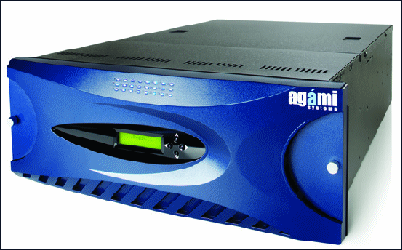Datacenter consolidation comes in many forms. Some companies use
virtualization running multiple pieces of software on one box, or storing a ton
of data in a pool. Other times, it’s as simple as running data stored with two different protocols on a single machine.
Following that format, startup agámi Systems introduced a so-called “hybrid”
storage server capable of concurrently storing file- and block-based data.
The agámi (meaning “future” or “forward” in Sanskrit) Information Server
(AIS) pipes network-attached storage (NAS) and Internet-based SAN (iSCSI)
data to servers at a maximum rate of 1 gigabyte per second.
Traditionally, arrays manage storage protocol — either (NAS) or storage
area network (SAN) — and companies typically have had to buy separate
arrays to store different data types.
Handling NAS
machine allows companies to trim hardware acquisition costs; this is a
significant value proposition at a time when purchasing managers are looking
to reign in IT costs and decrease energy consumption and space in datacenters.
Network Appliance and EMC stand in agámi’s way because they control about 70
percent of the NAS market and are also aggressively marketing hybrid systems
to cost-conscious corporations.
Paul Speciale, vice president of product management at agámi, said agámi
will compete by offering the self-replicating, virtualized machines at a
lower price point without sacrificing performance or capacity.
The AIS 3000 is a 4U rack-mount machine that stores up to 12 terabytes
roughly $100,000.
The AIS systems use SATA
AMD Opteron processors that employ HyperTransport, a high-speed data link
that lets CPUs talk to disks and the network at a speedy rate.
Speeds and feeds are all well and good. But Speciale said AIS stands apart
from EMC and NetApp because its operating system includes a file system
replication technology so the box effectively “replicates itself over
IP networks” across near or far distances.
Moreover, while replication software from the big competitors engages in fill
block changes over the wire, agámi allows IT managers to replicate as little
as 100 bytes a shot in real time.
Speciale said agámi is targeting its AIS systems for large-scale grid
computing, health care imaging and Army research.
Future iterations of the machine will include “federated administration” to
allow an admin to manage 12 boxes from one console, as well as a global
namespace so that customers can manage a cluster of machines as though they
are one.
The AIS 3000 and 6000 systems will be generally available by the end of
March and priced between $24,995 and $99,995, contingent on capacity and
configuration requirements.
The startup putting the cool in storage.
Source: Agámi Systems



